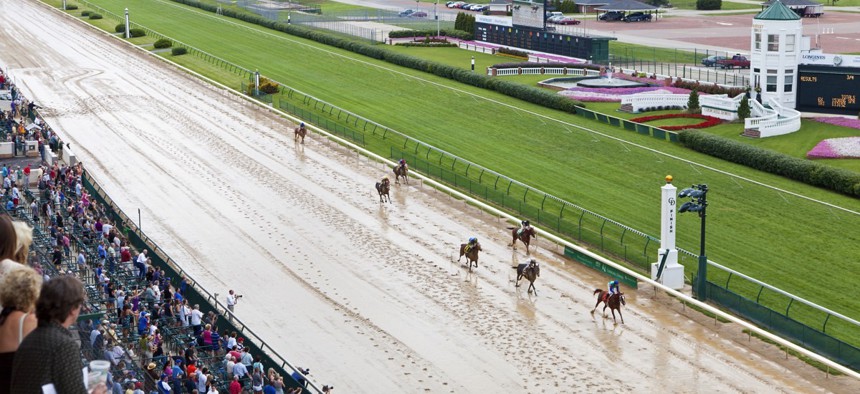As States Legalize Sports Gambling, Convenience and Tax Rates Are Key

Churchill Downs in Louisville, Kentucky.
There isn’t a one-size-fits-all approach to legalization, but one analysis says states should see serious budget revenue gains with the right policies.
WASHINGTON — States legalizing sports gambling will not only see more in-state gross gaming revenue but also private sector economic activity that boosts their gains beyond any tax on proceeds, according to an analysis by Regional Economic Models, Inc.
Gross gaming revenue, or GGR, refers to the amount of money retained by betting operations after payouts.
Following the Supreme Court’s May 14 decision, in Murphy v. National Collegiate Athletic Association, striking down federal restrictions on sports gambling, many states are considering GGR taxes to fund highway construction, pay for social services or make infrastructure repairs.
“Some of these priorities may be harder to get at with a smaller budget,” said Peter Evangelakis, a senior economist at REMI, at a Thursday discussion of sports betting policies in D.C.
While illegal bookies and office pools will also crop up, state legalization of sports gambling will increase sporting event sales from travel to food to merchandise. States that tax GGR will likely increase state spending, which will in turn generate more growth as the money is fed back into their economies, Evangelakis said.
The Professional and Amateur Sports Protection Act of 1992, the federal prohibition on sports betting that the Supreme Court overturned this year, allowed licensed sports pools to continue in Nevada. In 2007, the Nevada Gaming Control Board reported $248.8 million in state revenue from sports wagering.
An estimated 69 million people, 28 percent of U.S. adults, bet on sports—averaging $1,554 per bettor annually, according to a 2015 Ernst & Young survey.
States have two main choices when considering legalizing sports gambling: how convenient to make access and how much to tax GGR.
REMI’s model considers “low convenience” gambling to be limited to brick and mortar casinos, “moderate convenience” to include gas stations and convenience stores, and “high convenience” to add online betting to the mix. A low tax is 6.75 percent, base tax would be 10 percent, and a high tax is 15 percent.
Kentucky has horse racing with legal gambling and a state lottery but no casinos, so it’s considered moderate convenience. REMI’s 10-year model projects Kentucky would see a $93.6 million increase in GGR if the state legalized sports gambling this year, which translates to a $9.4 million increase in state revenue with a base tax of 10 percent.
State employment would spike in 2019 with two-thirds of new jobs in the gaming sector, dipping slightly as prices rise. Migration would more gradually increase before leveling off around 2029.
The gross domestic product in Kentucky would increase by about $150 million and personal income by $80 million, the analysis concludes.
Connecticut, which is home to the second- and third-largest casino in the U.S., is otherwise a low convenience gambling state. Should Connecticut legalize sports betting, REMI says it would see a $139.5 million increase in GGR and $9.4 million increase in state revenue with a low tax of 6.75 percent.
“I will say here the impacts are more muted,” Evangelakis said. “Connecticut’s gaming sector has much higher productivity, so even though the size of the sales and the revenue rises faster, they need less employment.”
Dave Nyczepir is a News Editor at Government Executive’s Route Fifty and is based in Washington, D.C.
NEXT STORY: Critics of Online Sales Tax Ruling Urge Congress to Rein in States






